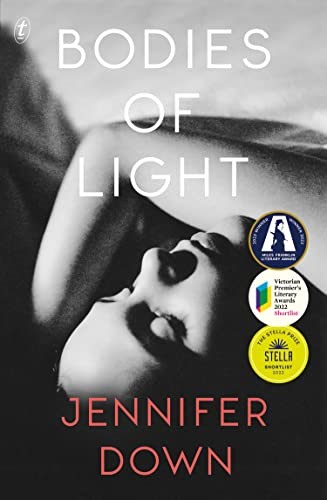“I don't see myself as ambitious”: Miles Franklin winning alum Jennifer Down on writing and success

by Sarah Hall
One of Jennifer Down’s earliest memories is of her mum and grandpa “shitcanning Jeff Kennett".
“It must have been '93 or '94, and he’d just completely stripped the guts out of social services, things like psychiatric institutions and hospitals,” she said when we spoke on the phone last week.
Both of Down’s parents work with vulnerable young people, and the institutional and structural problems impacting their clients’ lives have been part of the dinner table conversation since she can remember.
These conversations may have helped Down to construct the world of Bodies of Light, her triumphant second novel (and third published book - the second of which is a collection of short stories), which has taken this year’s Miles Franklin. The lead character Maggie is taken away from her father at age five, from their home at the Southern Aurora Hotel in Dandenong (‘Dad called the Southern Aurora the Pig Pen. The three Fs, he’d say— Fosters, flogs and fights’), when he is sent to jail for drug-related manslaughter. Her mother died from an overdose when she was two. Maggie spends the rest of her childhood between group homes, foster families and other institutional care settings in Melbourne, which in Maggie’s words were sometimes okay, ‘and mostly they were really fucked’. She is sexually assaulted twice by the age of 11.
The book explores the harmful impacts of this kind of childhood on Maggie’s life, compounded by the unspeakable additional trauma of losing three children in adulthood. It spans four decades of Maggie’s life, a period in which she changes her identity multiple times and is ‘... for a long time, successful at not remembering.’
Bodies of Light is a technical feat, a harrowing exploration of Maggie’s life, but also a testament to the resilience of her spirit. The Miles Franklin judges have heralded the author for inviting readers to “witness the all-too-often concealed, destructive forces of institutionalised care.”
While Down says that raising awareness about these problems would be the best possible outcome of the book, this was not necessarily her intention.
“When I'm writing fiction, I really don't want to think about an audience because otherwise I'll just second-guess myself into the ninth circle of hell,” she said.
“It would feel quite lofty to sit down and think, ‘I'm going to write a book that makes people really think about their complicity in structural problems…’"
For a book incredibly ambitious in its scope (and length), which took four years to write in slivers of time around full-time work, Down remains humble about the novel’s success. She said the financial security it provided was hugely significant, but the star-on-the-cover element felt intangible.
“But it's probably changed my life in ways that I don't understand or don't know about yet,” she adds.

Before we spoke, Down had been walking a dog with a friend, who recounted that a couple of her colleagues, who work at a women’s legal centre, were reading Bodies of Light.
“I almost feel bad for these people,” said Down.
“Their day-to-day [work] is just rough in a way that mine is not. And I was like, ‘I hope those people don't feel obliged to read it because it has a sticker on the front and/or because I'm your friend.’”
Down is speaking at the opening night of the Melbourne Writers Festival, alongside two other forces in Australian literature Professor Aileen Moreton-Robinson, and Mohsin Hamid. The theme of the talk is ‘ambition’.
“I've actually been really struggling with this topic because I don't see myself as ambitious….For better or worse, it strikes me as an almost ugly emotion,” she said.
In addition to winning the Miles Franklin, Bodies of Light was shortlisted for the Stella Prize and the Victorian Premier's Literary Award. That an authour who has won these accolades does not consider herself ambitious is in some ways refreshing. Down’s relationship with writing seems more to do with having a dedicated practice than any external indicators of success. Less refreshing is what this may say about Down’s perspective on Australia’s arts economy.
She is currently in the research phase for her next book dealing with precisely this theme.
“I’m thinking about, I guess, what it means to age, and come of age, and then become middle-aged in an arts economy that is pretty, well… stuffed.”
Thankfully, while critical about the broader situation for arts practitioners in Australia, she is personally on a good wicket.
“I have a great relationship with my publisher, I have an editor who I adore and I'm very supported by them. I also work a day job, so I'm not experiencing the financial pressure of trying to carve a living out of my fiction, which would be unimaginably stressful.”
Funding issues aside, she speaks about the immense talent and creativity of local writers. As an audience member at Melbourne Writers Festival, she is most looking forward to a talk by fellow Melbournian writers Isobel Beech (Sunbathing) and Victoria Hannan (Marshmallow).
Whether or not she sees herself as ambitious, Down is a writer unafraid to tackle difficult and complex themes pertinent to Australian readers. Her books are generous offerings to our literary scene, however precarious that might be.
Jennifer Down graduated from the University of Melbourne with a Bachelor of Arts majoring in Political Science and French, with Honours (French). She concurrently studied a Diploma of Languages (Japanese).
Bodies of Light is published by Text Publishing.
---
As one of the Melbourne Writers Festival's Major Partners, the Faculty of Arts is delighted to offer University staff a 10% discount on all live events. Simply enter MELB2022 to activate the discount at checkout. Explore the Melbourne Writers Festival program.